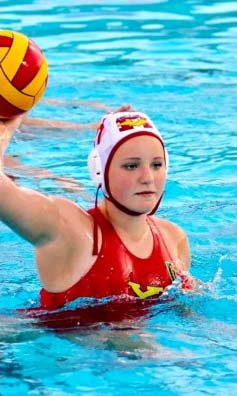From www.ocvarsity.com
By Dan Albano
 Ashley Klein felt perfectly healthy. There were no hints that anything was wrong.
Ashley Klein felt perfectly healthy. There were no hints that anything was wrong.
But her sports physical last June suggested something was indeed amiss. The resting heart beat of the Mission Viejo water polo player and swimmer was elevated.
An additional echocardiogram showed the condition was serious, so much that Klein’s father, Daniel, called her while she was at the movies with friends. They needed to get the hospital. Fast.
“It was kind of unbelievable,” Klein, 16, recalled. “I really had no idea anything was going on.”
Klein was admitted to the emergency room at Children’s Hospital of Orange County. She underwent a harrowing procedure that not only helped her return to water polo but become an advocate for physicals for high school athletes.
Klein smiles shyly but her determination quickly surfaces as she recounts her story.
She was diagnosed with ventricular tachycardia or rapid heart beat. Her ejection fraction, which measured how well her heart was pumping out blood, was dangerously low, her mother, Lisa, said.
While at CHOC, scenarios such as heart transplant, bypass surgery and pacemaker were presented.
“It was like someone hit me upside the head,” Lisa said of the scenarios. “I got this healthy kid (I thought).”
CHOC first used medicine to stop Klein’s heart for a few seconds, hoping it would reset and beat at a normal rate, the family said. The strategy, however, didn’t work. The procedure did reveal the tachycardia, Lisa said.
This condition also weakened and enlarged Klein’s heart muscle, leading to a second diagnosis called tachycardia-induced cardiomyopathy, CHOC said.
Klein’s cardiologist at CHOC, Dr. Anthony McCanta, moved onto a procedure known as radiofrequency ablation.
McCanta, a Servite graduate who has performed the procedure about 600 times throughout the country, accessed her heart through a vein in her leg. He attempted to freeze the cells causing the problem.
McCanta and his team used catheters to create a 3-D shell image of Klein’s heart. This provided a map for the procedure.
But when then freezing didn’t work, the cells were burned away with radio frequency.
McCanta said the procedure was especially difficult because the target area was so close – about 5 millimeters — to Klein’s normal wiring of her heart.
“I’ve done 600 but I’ve never done one exactly like hers,” he said.
There were risks if the procedure missed its mark.
“It was really close to the good cells, so if they burned the wrong area, they would have had to put a pacemaker in,” Klein said. “They got it right where it needed to be and it worked out.”
The procedure lasted almost eight hours.
“It was nerve-racking,” Lisa said. “We’re so lucky. … Dr. McCanta was amazing.”
Klein emerged grateful for her care at CHOC and the support of her friends, teammates and family. She also is now an advocate for physicals.
“Had (my condition) not been caught, (doctors) don’t know if I would have been alive within two weeks,” Klein said. “(Physicals) are overlooked. I was like, ‘Do I have to go?’ …It’s a lot more important than you think.”
Klein didn’t play water polo last summer but still went to games and practices. Her sister, Emily, is a freshman water polo player at Mission Viejo. Her brother, Reed, also played for the Diablos.
But by late August, she was cleared to return to competition after undergoing a stress test.
She started the season on time with the junior varsity squad. McCanta attended her first scrimmage.
“She had a life-threatening condition,” he said. “Her heart function has improved significantly and just to see her get back out here is awesome.”
Klein is enjoying her return. She starts at defender for a JV team that is 19-1 overall and 6-0 in the Sea View League.
“It’s good to be back in the water,” she said.











